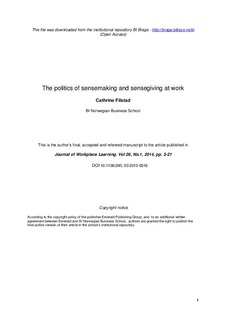| dc.description.abstract | Purpose – The aim of this paper is to investigate how political activities and processes influence sensemaking and sensegiving among top management, middle management and employees and to examine its consequences for implementing new knowledge.
Methodology – Data were collected in a Norwegian bank using in-depth interviews with middle managers and financial advisers. Observations of meetings, informal conversations and verbatim notes were also used in data collection among top managers. A practice-based approach was used as an analytical lens.
Findings – Top managers’ political activities of excluding others from the decision process affects their sensemaking and resulted in sensegiving contradictions between spoken intent and how to change practice. Middle managers’ political activities were to accept top managers’ sensegiving instead of managing themselves in their own sensemaking to help financial advisers with how to change their role and practice. As a result, middle managers’ sensemaking affects their engagement in sensegiving. For financial advisers, the political processes of top and middle managers resulted in resistance and not making sense of how to change and implement new knowledge.
Originality – No studies to our knowledge identify the three-way conceptual relationship between political activities, sensemaking and sensegiving. In addition, we believe that the originality lies in investigating these relationships using a three-level hierarchy of top management, middle management and employees.
Research limitations – A total of 30 in-depth interviews, observations of five meetings and informal conversations might call for further studies. In addition, a Norwegian study does not account for other countries’ cultural differences concerning leadership style, openness in decisions and employee autonomy. | nb_NO |
